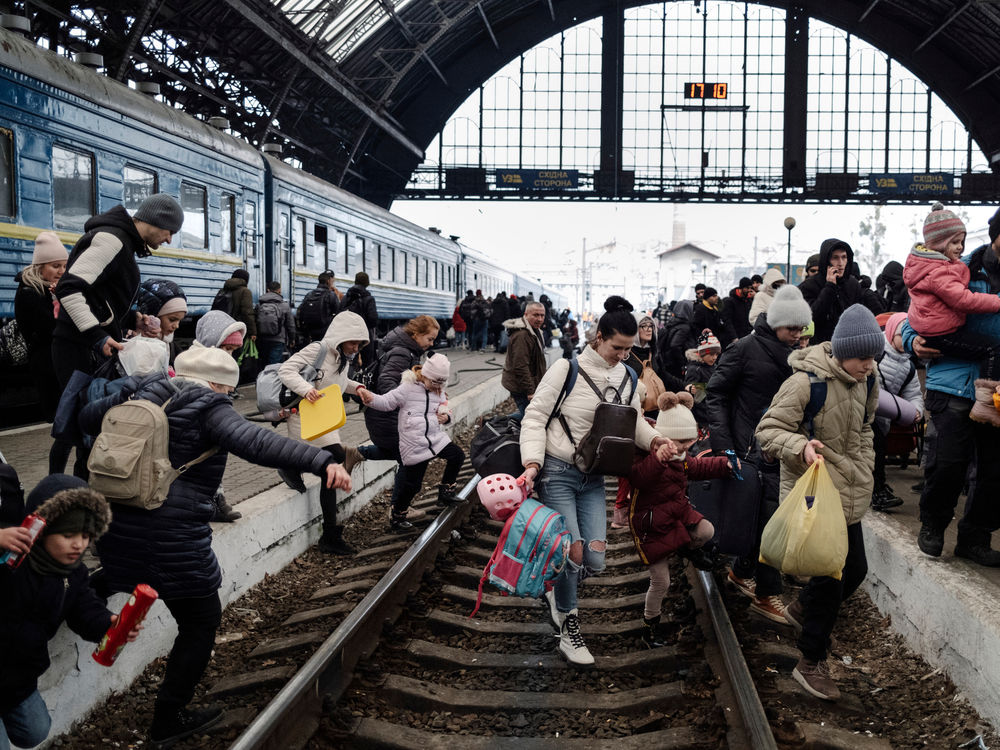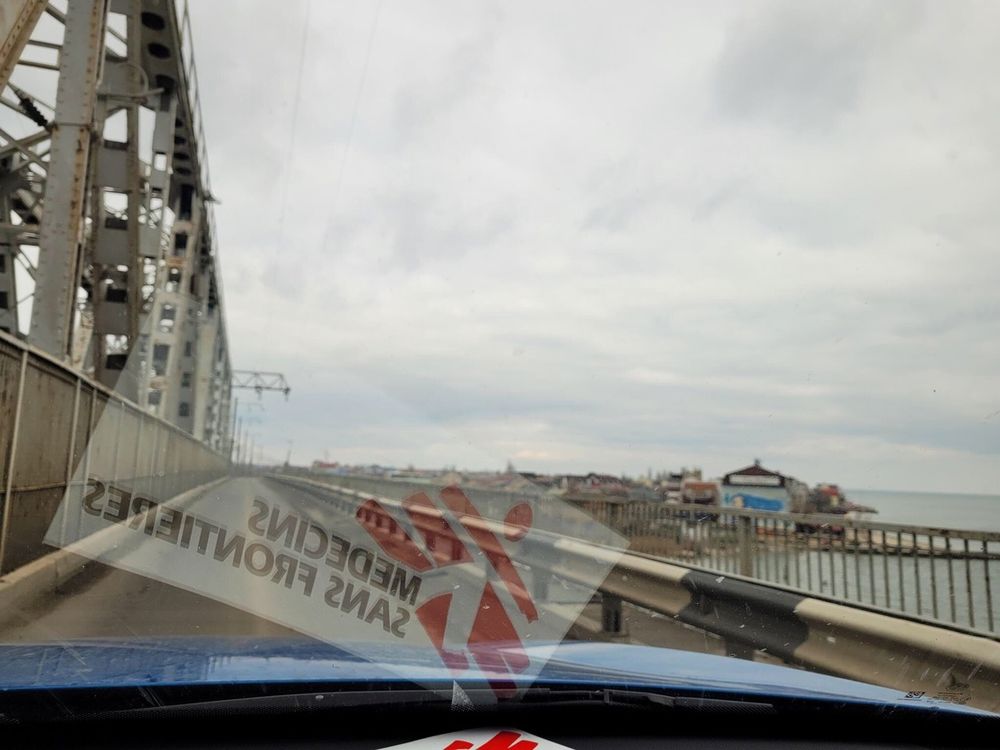Since the outbreak of fighting across the country, MSF teams have been working around the clock to mount a response to meet urgent needs.
Inside Ukraine
Supplies to Hospitals
MSF has been in contact with hospitals across the country. Many of them are desperately in need of supplies to treat war wounded and provide ongoing care for patients with chronic diseases and other conditions. MSF has now donated most medical supplies we had prepositioned in the country, including donating surgical/trauma and mass casualty kits to hospitals in the east of the country and in Kyiv. Additional MSF supplies have begun to reach the country.
This past weekend (Saturday 5 March), MSF was able to bring in 120 m3 of medical supplies – a third of these supplies were immediately rushed on by train to the Ministry of Health in Kyiv for use in hospitals in the capital and in towns further east. Additional supplies will be arriving in the country this week and beyond. An important focus for the MSF teams will be to ensure that we able to provide the right medical supplies to the right hospitals at the right time, based on their needs and the challenges they are facing.
Eastern Ukraine
MSF has been working in eastern Ukraine since 2014. Since the war started, we have maintained contact with the volunteers and health facilities we work with. They continue to provide information to help MSF identify needs, particularly in terms of supplies needed by hospitals.
Since 24 February, we have donated medical supplies to help hospitals treat people injured as a result of conflict. Some hospitals have reported that they have treated dozens of wounded people at times. Hospitals also report shortages of medications to treat people with chronic diseases such as insulin for patients with diabetes.
Kyiv
MSF has donated supplies of materials to treat war wounded to Kyiv hospitals as well as supplies to support hospitals to deal with mass casualty incidents.
Western Ukraine
Teams are assessing the needs in various towns/cities in western Ukraine. In Lviv, teams have begun offering training to hospitals to support them to manage large numbers of wounded arriving at the same time and to deal with war wounds.
Southern Ukraine
The health system has already been disrupted by the war. Most importantly, supplies are running low at many hospitals. This will affect the ability of hospitals to respond to the direct consequences of war, as well as to treat patients with chronic diseases. Cities such as Odessa are preparing for further attacks and siege.
In Odessa, our teams have been able to evaluate the situation. We will help with the preparation of hospitals to take care of the wounded (training, support for triage, patient stabilisation...). We are also considering helping to set up advanced medical posts – small emergency rooms capable of providing first aid to the injured, before transporting them to hospitals. We also plan to continue to help with the supply of medicines in order to prevent shortages.
Extremely dire situation in Mariupol
Mariupol city is currently surrounded and subject to heavy shelling. Our staff tell us that shops are no longer functioning, and most have been cleaned out by people looking for basics such as food. There is no heating or electricity. Pharmacies have run out of medicine. Most worryingly, there is no access to clean water – staff report that people are melting snow and collecting rainwater to drink and breaking open heating systems to wash their hands. Over three days (5, 6 and 7 March) a ceasefire was three times agreed to allow civilians to move out of the city safely. Each time the ceasefire failed. The situation in the city is growing more and more desperate.
Around Ukraine
Poland
According to UNHCR, more than over one million people have fled Ukraine to Poland alone. In Poland, the number of daily arrivals continues to increase daily. Our emergency teams are at the Polish-Ukrainian border and elsewhere in Poland assessing medical humanitarian needs. We are also trying to get essential staff and supplies into Ukraine and set up emergency response activities across both sides of the border.
So far, our operations inside Poland remain modest. This is mostly because there is already a robust response by Polish civil society. MSF has donated shelter-related items to the Red Cross Lublin. Our teams have visited transit centres in five cities (Warsaw, Lodz, Wroclaw, Katowice, Krakow) mostly based at train stations, and a few temporary shelters. Our teams saw hundreds of people, including children, sleeping on the floor of Krakow train station. Our teams have also spoken to people arriving at transit centres in Wroclaw, Krakow and Katowice. They met people who had travelled from different areas of Ukraine, mostly from Kharkiv, by train. MSF observed many people were distressed, confused or disoriented, and many had no plans on where to go next.
We have met and spoken to local authorities, NGOs, civil society groups and volunteers helping men, women and children crossing and providing tea, soup, clothes and blankets.
MSF teams are also based in Poland to support our activities in Ukraine with supplies of medicines and medical equipment.
Hungary
We have an initial team assessing the situation and needs of people crossing the border, with a focus on identifying less visible needs for particularly vulnerable people or groups.
Moldova
MSF has sent teams to the north and southeast to assess the situation of refugees at the border crossing points and focusing on analysing the possibility to support chronically ill patients or mental health needs. In Palanca, MSF will start providing primary health care consultations for refugee populations starting 9 March.
Slovakia
Most of the refugees arriving in Slovakia seem to be in transit. An MSF emergency team arrived in the country in the beginning of March. After meeting with administrative officials, representatives of local NGOs and visiting some border areas to assess uncovered medical and humanitarian needs, we are currently negotiating a Memorandum of Understanding with the Ministry of Health to ease the import of medical supplies and enable our possible work in the future. There are currently no critical needs uncovered in terms of healthcare, shelter and other humanitarian services at the Slovakian side. However, as the war in Ukraine continues to create further displacement of people, we aim to keep a team monitoring regularly the border and step in to support the local authorities in case it is needed. At the same time, we are preparing to do cross-border assessments inside Ukraine in order to evaluate the situation of the health system and of the internally displaced people in southwestern areas of the country, starting with Uzhgorod.
Russia
MSF works with the health authorities in Arkhangelsk and Vladimir regions to reduce the burden of drug-resistant tuberculosis (DR-TB) and improve treatment for the disease.
MSF is currently conducting assessments in the south of Russia to see whether new medical humanitarian needs have emerged. We have also made some donations such as food, hygiene kits and medicines to support refugees.
Belarus
In Belarus, MSF continues to run its regular programmes. We support the national tuberculosis (TB) programme and hepatitis C treatment in prisons. In 2021, we also assisted people on the move stranded between Belarus and the EU.
An MSF assessment team has moved to border areas of Belarus and Ukraine border to assess potential medical and humanitarian needs.



